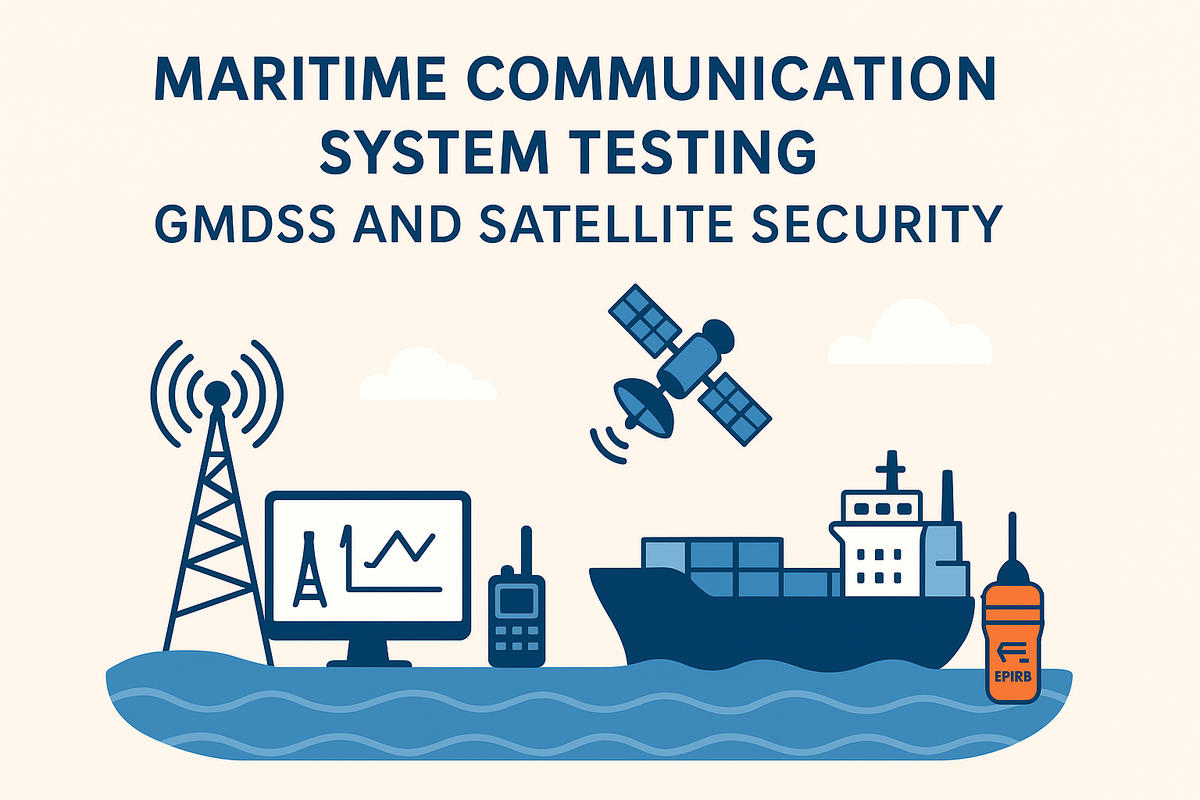Maritime Communication System Testing: GMDSS and Satellite Security

Introduction
Maritime communication is a critical aspect of modern shipping and navigation safety. The Global Maritime Distress and Safety System (GMDSS) is a globally recognized system designed to ensure that ships can always send and receive distress alerts and safety information regardless of their location. Coupled with satellite communication technology, GMDSS enhances safety at sea, enabling rapid rescue and coordination efforts. Testing these systems and ensuring satellite communication security are vital to maintaining maritime safety.
Understanding GMDSS
The Global Maritime Distress and Safety System (GMDSS) is an internationally agreed-upon framework approved by the International Maritime Organization (IMO) under the SOLAS convention. It automates distress signaling and ensures that ships at sea can communicate emergency information reliably.
GMDSS integrates different communication technologies including Very High Frequency (VHF), Medium Frequency (MF), High Frequency (HF) radios, and satellite systems such as Inmarsat. Its primary goal is to enable ships to send distress alerts effectively, coordinate search and rescue operations, and receive maritime safety information.
Sea Areas in GMDSS
GMDSS categorizes the world's oceans into four distinct sea areas based on communication coverage, each requiring specific equipment:
- Sea Area A1: Up to 20-50 nautical miles from shore, covered by VHF DSC (Digital Selective Calling).
- Sea Area A2: Extends beyond A1 up to 100-200 nautical miles using MF DSC.
- Sea Area A3: Global coverage between 70° North and 70° South, using satellite communication like Inmarsat.
- Sea Area A4: Polar regions, outside A1, A2, and A3, where HF systems dominate.
Components of Maritime Communication Systems
Key components of GMDSS include:
- Shipborne radio stations equipped for VHF, MF, and HF communication.
- Satellite communication terminals (e.g., Inmarsat terminals) enabling global messaging.
- Digital Selective Calling (DSC) systems automating distress alerts.
- Emergency Position Indicating Radio Beacons (EPIRB) and Search and Rescue Transponders (SART) for locating vessels in distress.
- NAVTEX for broadcasting maritime safety information.
Testing of Maritime Communication Systems
Testing GMDSS equipment onboard ships is essential for compliance and operational reliability. Testing involves:
- Routine daily, weekly, and monthly test procedures for VHF/MF/HF and satellite equipment.
- Verification of DSC functionality and alerting mechanisms.
- EPIRB and SART operational checks.
- Integration tests between ship systems and rescue coordination centers.
Testing ensures the systems are fully functional when emergencies arise, minimizing distress call failures.
Satellite Communication Security in Maritime Systems
Satellite systems such as Inmarsat are crucial for GMDSS, especially for global sea areas. However, satellite communication faces security challenges including:
- Signal interception and eavesdropping risks.
- Spoofing and false distress alerts.
- Cybersecurity threats to satellite terminals and control networks.
Security measures include encryption, authentication protocols, regular firmware updates, and network monitoring, ensuring the integrity and confidentiality of distress and safety communications.
Conclusion
The GMDSS, supported by advanced satellite communication, forms the backbone of modern maritime safety communication. Regular testing of these systems is imperative to maintain their reliability. Concurrently, securing satellite communications against cyber threats protects the lives of mariners and the environment. Together, effective system testing and robust satellite security sustain safer seas worldwide.
Take the Next Step with CodeSecure Solutions
Cyber threats are growing more sophisticated every day. With a trusted partner by your side, you can safeguard your business while focusing on what truly matters—growth and innovation.
At CodeSecure Solutions, we deliver comprehensive cybersecurity services in Chennai, uniquely tailored for startups, SMEs, and enterprises:
- Vulnerability Assessment & Penetration Testing (VAPT)
- Network Security Solutions
- Compliance Support (ISO 27001, PCI-DSS, HIPAA, DPDP Act, GDPR)
- Cloud & Endpoint Protection
- Security Awareness Training
No matter your industry or size, CodeSecure customizes solutions to fit your needs—ensuring your data, reputation, and operations remain secure.
Ready to Strengthen Your Defenses?
- 📞 Call: +91 73584 63582
- ✉️ Email: [email protected]
- 🌐 Visit: www.codesecure.in
Stay secure. Stay informed. Choose CodeSecure Solutions—your partner in cyber resilience.
